News from 2008
Philip Verwimp lectures at John F. Kennedy School of Government, Harvard University
12/12/2008
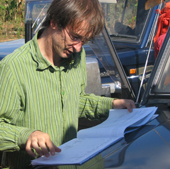
Philip Verwimp carrying out fieldwork in Burundi
Philip Verwimp gave a lecture entitled, 'Rebel Recruitment, Taxation and Violence in Civil War' at the Kennedy School of Government, Harvard University, on 4th December. The lecture presented a paper analysing data from field research undertaken for MICROCON project 15, 'Civil War and Activity Choice. It uses micro-level data to explore the determinants of victimisation at the community, household and individual level.
The paper was co-authored with Eleonora Nillesen, who also presented the paper at the Households in Conflict Network's Fourth Annual Workshop at Yale University, on 5th December.
Philip Verwimp publishes opinion piece on civil war in Africa in L'Echo
13/11/2008
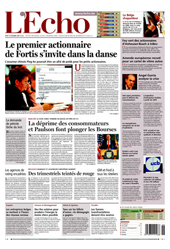
Belgian newspaper, L'Echo
Philip Verwimp has written an opinion piece in L'Echo, the leading economic newspaper for French-speaking Belgium. The article was based on his recent MICROCON Research Working Paper, 'Consumption Growth, Household Splits and Civil War', co-authored with Tom Bundervoet.
Entitled, 'Le salaire au bout de leur Kalachnikov', the article discusses the economic motivations for joining rebel groups, and how to put an end to wars in Africa. He argues that assuring the security of populations and rebuilding infrastructure is necessary, but not sufficient to prevent violent conflict. It is also important to reconstruct social capital and offer sufficient economic opportunties outside the membership of militias.
Yvan Guichaoua interviewed by Le Journal du Dimanche on the taking of hostages in the Gulf of Guinea
04/11/2008
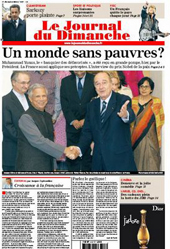
French newspaper, Le Journal du Dimanche
Yvan Guichaoua was interviewed by the Journal du Dimanche about the siezing of ten hostages by the 'Bakassi Freedom Fighters' in the Gulf of Guinea. Little is known about this group, and it only recently came into existence, although the Bakassi peninsula has been a site of tensions between Nigeria and Cameroon for around 20 years.
The sovereignty of the peninsula was transferred to Cameroon in August 2007, in what was seen as a diplomatic success. However, the local population, which is essentially Nigerian, was not consulted. When Cameroon's security forces - feared by the Nigerians of the peninsula - arrived, several tens of thousands of Nigerians fled into Nigeria. The Bakassi Freedom Fighters seem to be echoing the local population's concerns.
Yvan is a researcher on MICROCON's project 'Motives for fighting and group mobilisation'.
MICROCON members present papers at conference at CEAN, Bordeaux
27/10/2008
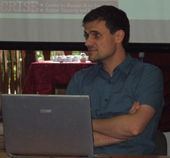
Yvan Guichaoua, who presented his MICROCON work on Niger at the conference
MICROCON researchers Yvan Guichaoua, Koen Vlassenroot, Karel Arnaut and Morten Bøås presented papers at a conference entitled, 'Armed conflicts in Africa: Local approaches, global context'. The opening talk was given by Stathis Kalyvas, member of MICROCON's advisory board, on the changing character of warfare in civil wars.
The conference was held at the Centre d'étude d'Afrique noire (CEAN) in Bordeaux, and covered a range of themes including governance and crisis, methodology, the conflict in the Democratic Republic of Congo, the Touareg conflict, and economies and conflict.
For more information, download the conference schedule.
CRISE issues call for papers for workshop on the law and group-based inequalities
27/10/2008
The Centre for Research in Inequalities, Human Security and Ethnicity (CRISE) at the University of Oxford is organising a two day workshop on the theme of the law and group inequalities on the 14th and 15th May 2009. The central theme is that of using the legal system to reduce group inequalities, and submissions of abstracts are invited. The deadline is 20th November 2008.
For more information, download the call for papers.
Philip Verwimp gives lecture to the Association of European Economics Education on the economics of conflict.
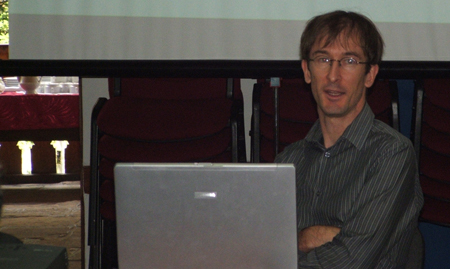
Philip presenting at the MICROCON workshop in Bulgaria
22/10/2008
Philip gave a lecture last month to the Association of European Economics Education on the state of research on the economics of conflict. He gave the talk in his capacity as President of the Flemish/Dutch chapter of Economists for Peace and Security.
Download the presentation slides.
Nathalie Tocci publishes paper on the transformation of Turkey's Kurdish question
07/10/2008
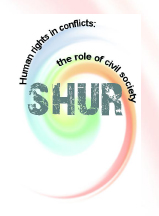
The SHUR research project
Nathalie Tocci has co-authored a paper with Alper Kaliber entitled 'Conflict Society and the Transformation of Turkey’s Kurdish Question'. The paper is published by SHUR, a European-funded research project looking at the role of civil society actors in ethno-political conflicts. The authors view the situation in Turkey as a conflict between the Turkish state and the Kurdish nationalist movement, rather than as a veritable conflict between Turks and Kurds. In light of this, they examine how the nature of the Turkish state and democracy has influenced critically the character of 'Conflict Society Organizations' in Turkey.
Nathalie is the leader of our Work Package on Conflict in the European Neighbourhood.
Tilman Brück honoured as 'outstanding scientist'
23/09/2008
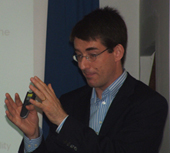
Tilman Brück
Tilman Brück, Deputy Director of MICROCON and Head of the Department of International Economics at the German Institute for Economic Research (DIW Berlin), was honoured as an “outstanding scientist' by the InterAcademy Panel on International Issues (IAP) and by the World Economic Forum (WEF) for his work on conflict and insecurity. Only two German scientists received this distinction.
The award includes an invitation to attend the World Economic Forum’s 2008 Meeting (also known as “Summer Davos”), which Tilman will attend as one of 66 selected young scientists from around the world. The meeting will be held at the end of September in Tiajin (China). More than 1500 international representatives from politics, business and science are expected to attend, including the Chinese Prime Minister Wen Jiabao.
Tilman’s research interests focus on development economics, especially poverty and employment issues, international economic policy and the economics of terrorism and insecurity. In 2001, he received a doctorate in economics from the University of Oxford. He has since worked at DIW Berlin.
He is the leader of project 1: Determinants of individual participation in collective violence, project 17: Coping with conflict, and of the Work Package Evaluating Conflict Interventions.
Lars Wirkus publishes brief on 'Monitoring Environment and Security'
22/09/2008
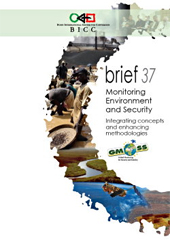
Monitoring Environment and Security: The new BICC brief edited by Lars Wirkus and Ruth Vollmer
Lars Wirkus has coedited a brief entitled, 'Monitoring Environment and Security: Integrating concepts and enhancing methodologies', for the Bonn International Center for Conversion.
The environment-security nexus is not a new topic in academic and political discourse, but it has currently gained new significance due to a number of factors. Growing concerns about global environmental change including climate change and fears about increasing demand and competition for natural resources caused by population growth and economic development both figure prominently among these factors.
The brief is based on the proceedings of the Seminar ‘Environment and Conflict—Evaluating and strengthening the means of interdisciplinary cooperation’. The primary aim was to locate.
Lars is a researcher on project 26: Water management and violent conflicts.
International Day of Peace, Sunday 21st September 2008
19/09/2008

The United Nations' International Day of Peace takes place on 21st September each year. It is a global holiday when individuals, communities, nations and governments highlight efforts to end conflict and promote peace. It was established by a United Nations resolution in 1981 to coincide with the opening of the General Assembly.
The first Peace Day was celebrated in September 1982. It has grown to include millions of people in all parts of the world, and each year events are organized to commemorate and celebrate this day. Events range in scale from private gatherings to public concerts and forums where hundreds of thousands of people participate. For more information visit the International Day of Peace website.
To coincide with this event, we have published a policy briefing on international peacemaking.
Places still available for the Network for the Economic Analysis of Terrorism's Second Workshop, Brussels, 22nd September 2008
07/08/2008
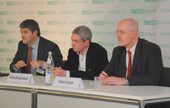
The first NEAT workshop in April
The topic of the Network for the Economic Analysis of Terrorism (NEAT's) second workshop will be 'The Economic Analysis of Terrorism: The Current State of Research and Its Policy Relevance'. The network connects a group of leading European economists working on terrorism and security.
There is no registration fee for this event, but space is limited. The deadline for registration is Wednesday, August 20th.
Frances Stewart's new book on horizontal inequalities and conflict launched on Whitehall
07/07/2008
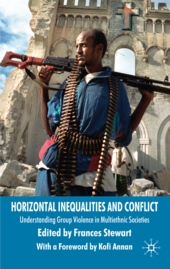
Horizontal Inequalities and Conflict: The new book edited by Frances Stewart
Frances Stewart and the team from the Centre for Research on Inequality, Human Security and Ethnicity (CRISE) have published a new book entitled, 'Horizontal Inequalities and Conflict: Understanding Group Violence in Multiethnic Societies'.
It was launched on 7th July in Whitehall, and was discussed by a panel including Mark Malloch Brown, Foreign Office, Ashutosh Varshney, Professor of Political Science, Ann Arbor University, Thandika Mkandawire, UNRISD Director and Nemat (Minouche) Shafik, DFID permanent secretary.
Drawing on original quantitative and qualitative research, the book shows that horizontal inequalities among religious or ethnic groups, in political, social, economic or cultural dimensions, are an important catalyst of violent conflict in multiethnic societies. The contributors identify policies to reduce horizontal inequalities and argue that such policies should now be routinely incorporated into the development agenda.
Frances is leader of MICROCON's Work Package on Group formation, identities and mobilisation.
Yvan Guichaoua interviewed in Les Echos on the taking of four hostages in Niger
26/06/2008
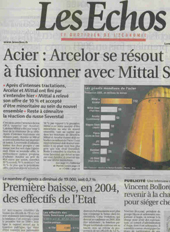
French newspaper Les Echos
Yvan Guichaoua, a researcher on MICROCON's project 'Motives for fighting and group mobilisation', was interviewed by French newspaper Les Echos about the taking of four French hostages in Niger last Sunday. The hostages are employees of the French mining company Areva, which is mining uranium in northern Niger.
The rebel group 'Mouvement des Nigériens pour la Justice' (MNJ) claimed responsibility for the kidnapping. The MNJ is demanding that 50 per cent of revenues from the mines should be paid to the regions where the resources are produced. Yvan said that the conflict is at an impasse, and that the MNJ is trying to use Areva as a line of communication with the outside world to force the government to negotiate.
Call for Papers now available for the Households in Conflict Network's Fourth Annual Workshop
05/06/2008
The Households in Conflict Network have released the Call for Papers for the Fourth Annual Workshop. The workshop is being organised in collaboration with Yale University's Program on Order, Conflict and Violence, and this year's theme is links between micro and macro level conflict processes.
Papers should be submitted by 30th September.
Yvan Guichaoua interviewed on Radio France International about the conflict in Niger
22/05/2008

Yvan Guichaoua
Yvan gave an interview to Radio France International about the conflict in Niger, focussing on the rebel group called le Mouvement des Nigériens pour la Justice (MNJ). He answered questions on the group's membership, the extent that the group's claims reflect the population's grievances and the possibility of international mediation.
Yvan is a researcher on project 2: Motives for fighting and group mobilisation.
Read the interview transcript here
Network for the Economic Analysis of Terrorism's Second Workshop to be held in Brussels, 22nd September 2008
16/05/2008
The Network for the Economic Analysis of Terrorism (NEAT) is inviting the submission of papers pertaining to the economics of security, for its second workshop in September. Accepted papers will be published on the project website and will be presented at the second NEAT workshop on Monday, 22nd September in Brussels. Papers must be submitted by Friday, 20th June 2008.
Tilman Brück chairs session at Third IZA/World Bank conference on Employment and Development
07/05/2008

Tilman Brück
Tilman Brück hosted a session on 6th May entitled 'War, refugees and investments' at the Third IZA/World Bank conference on Employment and Development. He also presented a paper entitled 'Leaving the Camps: The Effect of Conflict Reduction on Household Welfare and Labor Opportunities'. More information on the event can be found on the conference website.
Tilman is a Deputy Director of MICROCON, and leader of our Work Package Evaluating Conflict Interventions.
Ana María Ibáñez publishes World Development article on forced migration in Colombia
25/04/2008

Ana María Ibáñez
Ana María Ibáñez has published a paper with Carlos Eduardo Vélez in World Development. The article is entitled, 'Civil Conflict and Forced Migration: The Micro Determinants and Welfare Losses of Displacement in Colombia'. The paper has two purposes: Firstly, it seeks to identify adequate instruments for addressing the problem of displacement by estimating its determinants and comparing these findings with the standard migration literature. Secondly it estimates welfare losses associated with displacement, to determine whether the response to this problem has been proportional to its size.
Ana María is the leader of project 11: Displaced populations in Colombia.
Patricia Justino publishes IDS In Focus brief on Collier's The Bottom Billion
03/04/2008

IDS In Focus Series: Concern for the Bottom Billion
Patricia Justino has co-authored a paper with IDS' David Leonard entitled, 'Sources of Rebellion in Bottom Billion Countries'. The paper discusses Paul Collier's assertion of the greed hypothesis for violent conflict, restated in The Bottom Billion. His argument has generated impassioned denunciations, based on the many case studies attributing civil wars and rebellions to abuses, inequalities and injustices.
This In Focus brief examines the role that these grievances play in conflict and highlights the work of a range of authors. It also explores how state weakness is a major contributor to civil war, and assesses the merits and shortcomings of Collier’s contribution to the contentious conflict debate.
Patricia's paper is part of a series of thirteen papers discussing The Bottom Billion, which can be downloaded from the Institute of Development Studies website here. For more discussion of the greed and grievance hypotheses, see also MICROCON's Research Working Paper 2: Reappraising the Greed and Grievance Explanations for Violent Internal Conflict, by Mansoob Murshed and Zulfan Tadjoeddin.
Frances Stewart publishes paper on the political situation in Kenya
31/03/2008

Centre for Research on Inequality, Human Security and Ethnicity
Frances Stewart has published a note for discussion on the political situation in Kenya. It examines Kenya's horizontal inequalities, arguing that they are of colonial and geographic origin but did not lead to serious conflict until 2008 due to a political system that was basically inclusive from an ethnic perspective. This changed during the last few years of Mwai Kibaki’s presidency, and the ‘rigged’ elections of December 2007 meant that the political horizontal inequalities would not be corrected by the ballot.
Frances is the director of the Centre for Research on Inequality, Human Security and Ethnicity (CRISE), and leader of MICROCON's Work Package on Group formation, identities and mobilisation.
Network for the Economic Analysis of Terrorism Workshop to be held at DIW Berlin, 22nd April, 2008
18/03/2008
MICROCON partner, the German Institute for Economic Research (DIW Berlin), is hosting the first workshop of the Network for the Economic Analysis of Terrorism (NEAT). This network is funded by the European Commission and managed by DIW Berlin, and connects a group of leading European economists working on terrorism and security. The topics of the first workshop will include: an overview of what is known on this topic, what the gaps in knowledge are, and what the best way of moving forward is.
For more information on the programme and instructions on how to register to attend, download the invitation.
Nathalie Tocci publishes article on EU incentives for promoting peace in Accord
12/03/2008
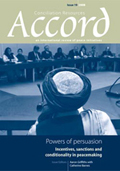
Accord: Powers of Persuasion
Nathalie Tocci has published an article entitled 'EU incentives for promoting peace' as part of the latest issue of Accord, published by Conciliation Resources. The article asks: Through which mechanisms can EU contractual relations incentivize conflict resolution, and what determines their effectiveness? In addressing this question, Nathalie discusses three mechanisms - conditionality, learning and 'passive enforcement' - and identifies three main determinants of EU effectiveness: the value of benefits, the credibility of obligations and the political management of contractual relations.
Nathalie is the leader of MICROCON's work on Conflict and the European Neighbourhood Policy.
Daniela Koleva presents paper on Oral Histories at the European Social Science History conference
29/02/2008
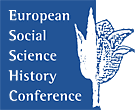
European Social Science History Conference
Daniela Koleva presented a paper entitled 'Oral History interviewing and the production of meaning: defending 'bad' questions' at the Seventh European Social Science History Conference in Lisbon on 1st March. The paper argues that the practices of oral-history interviewing seem to rest upon (1) an ‘authenticity myth’ (the less we interfere as interviewers, the more true the information is) and (2) a ‘solidarity myth’ (the more empathy we have for the interviewee, the better the result). While the former has been questioned, the latter seems to have remained largely unchallenged.
Daniela is a researcher on project 6: Muslim integration in Bulgaria and Serbia.
Tilman Brück publishes paper on external debt and post-conflict countries in World Development
15/02/2008
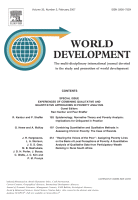
World Development
Tilman Brück, Deputy Director of MICROCON, has published a paper entitled 'External Debt in Post-Conflict Countries' in World Development. The article was co-authored by Patricia Alvarez-Plata, and attempts to address a gap in the development literature by providing a systematic study of external borrowing in post-conflict countries. It finds that many war-affected countries face rising debt arrears and deteriorating relations with creditors. The authors argue that debt relief for post-conflict reconstruction should embrace a more forward looking and generous conditionality.
